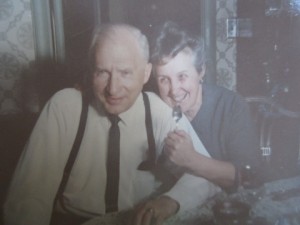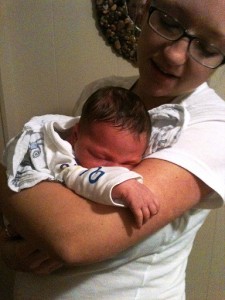My mother was, as they used to say, full of the dickens. She had enough energy for 4 people and injected fun into every day. Dad was her polar opposite, serious and steady, comfortable with quietness and content to come home after work and stay there.
But Mom was a plan-maker. I remember Dad arriving home after a stressful day of managing 250 engineers/architects, ready to relax with his newspaper, when Mom would say, “Carl, don’t take off your tie. We’re going out.”
Dad would wince, but in the end he’d comply. I felt sorry for him on evenings like that, but then one day he said, “If I hadn’t married your ma, I would have been a hermit.” Her conviviality was part of the reason he chose her, and part of why he loved her.
Despite having sympathized with Dad, though, I ended up doing the same thing with Nate. I look back in pictures and see him doing my bidding, still in his suit and tie after work: blowing up balloons for a party, moving furniture, or managing bath time hair washings. Near the holidays he’d be licking stamps for Christmas envelopes, packing Easter baskets, or carving pumpkins.
Just like Dad, he may have secretly winced when I announced my plans, but later the photos would bring a smile, and he’d remember those episodes as positive and charming.
All of us know the Lord regularly makes plans for us. When he lets us know what they are, do we wince and say, “You know, I’m really worn out and want to do my own thing for now.”
Or might we say, “You’ve got a good idea there, God, and I’ll definitely get on board. Someday.”
Or, “Actually, your plans don’t make the best use of my natural gifts, so please find someone else to do it.”
Or, “Don’t you remember, Lord? I tried that once before. It didn’t work then, so I won’t do it now.” Our excuses for not obliging can get quite creative.
What’s really happening, though, is that our God is letting us in on his highest and best for us, detailing plans that will lead to more plans, that will lead to supernatural conclusions. If we step around his groundwork tasks because it’s a hassle or inconvenience, we’re setting aside far more than just what he wants us to do right then.
Rejecting his plans for us is analogous to “dissing” him, which is slang for dismissing or disrespecting him, a far more serious matter than just opting out. It’s a telltale sign of a heart not truly committed to him.
What made Dad and/or Nate go along with the plans of Mom and me, even when it was difficult for them?
Love. Dad loved Mom. Nate loved me. And when love acts, the result is always more love, which is God’s plan exactly.
“God is love, and all who live in love live in God, and God lives in them.” (1 John 4:16)





